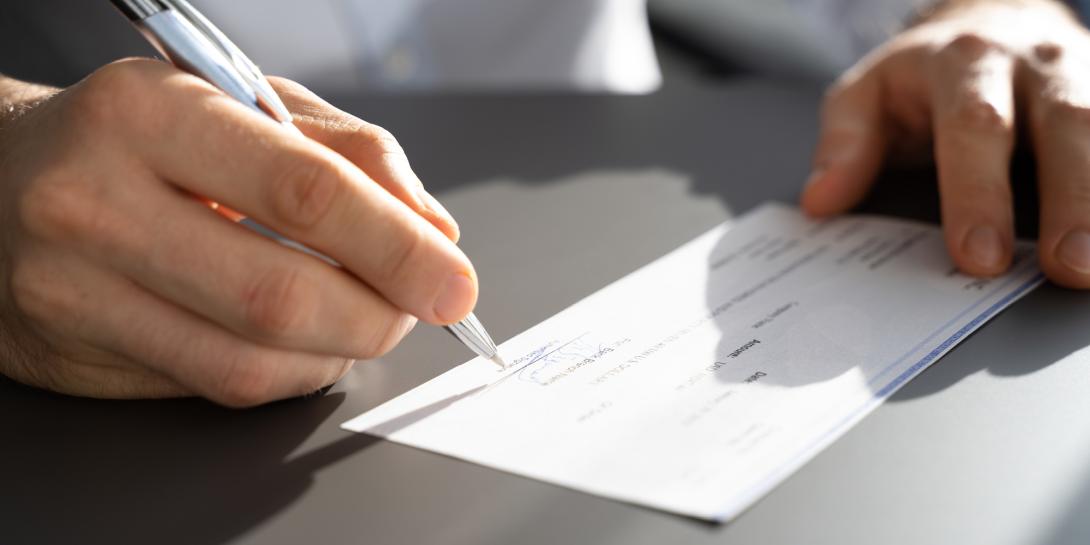Combating Check Fraud for Businesses

Many businesses use checks as a financial standard to pay vendors, employees, utilities and more. At least 81% of firms report using paper checks at least occasionally.1
In fact, checks are used for 1 in 3 business-to-business transactions.2 Unfortunately, these routine transactions have become a high-risk activity. In recent years, there has been a sharp rise in check fraud that’s linked with advances in technology and social media.
The rise of check fraud has affected 63% of organizations.3 It’s more important than ever for businesses to understand check fraud and implement preventative measures.
What is check fraud?
Check fraud is a catchall term for a variety of illegal acts involving checks. Here are a few of the most common types that businesses encounter:
Stolen Checks – This starts with genuine checks being taken from the account holder. They are most commonly obtained through mail theft, burglary, or other means. This is often where other forms of check fraud begin.
Forged Checks - Fraudsters attempt to forge the signature of account holders.
Counterfeit Checks – Fraudsters replicate legitimate checks, often changing the account number, payee name or amount. They may look convincing, but they were not authorized by the account holder.
Altered Checks – These are genuine checks where the information has been modified. Fraudsters may change the payee’s name, amount, date, or other information.
How can you protect your business?
The most effective way to prevent check fraud is to limit your use of checks as much as possible. The less checks your business has circulating, the less chances there are for a fraudster to get their hands on one.
Your business has many secure alternatives to using checks, including utilizing ACH and online bill pay.
However, we realize cutting out checks entirely may not be possible for your organization. Don’t worry there are still things you can do.
- Prioritize the Security of Checks Throughout their Life Cycle
- Storage of Unused Checks – Always keep checks in a secure place. Never leave checks unattended or accessible for others.
- Mailing - Always securely deposit outgoing mail inside your local post office, at your place of business or by handing it to a letter carrier.4 It may also be wise to consider security envelopes and utilizing one of the USPS tracking services.5
- Disposal – Make sure old or cancelled checks are only kept for as long as they are needed and then securely shredded.
- Regular Account Reconciliation – Conduct routine reviews of your online banking activity and bank statements. We recommend reviewing your accounts everyday, so you can act on anything out of the ordinary as soon as possible.
- Implement Positive Pay – This is a fraud prevention tool that matches the details of checks presented for payment with those previously authorized and issued by your business. Any discrepancies are flagged for your review, so you can stop fraudulent checks before they affect your account.
- Enable Alerts – Contact your Treasury Manager to add customized transaction alerts to your business online banking. That way you can be notified about checks and other withdrawals as soon as they post to your account.
- Use Indelible Ink – While no pen is fool proof, using an indelible pen meant for check writing can help prevent check washing. While you’re at it, make sure to never leave any spaces on your check where someone else could add different information.
- Train Your Employees – Educate your employees about check fraud and train them to recognize suspicious transactions. Establish clear protocols for verifying checks and handling potential fraud.
If you suspect your business has been affected by check fraud, take immediate action. Every moment matters when combatting check fraud.
- Contact the bank. We will take measures to protect your account and money.
- File a Police Report. This will help prove you are not responsible for the fraudulent charges.
- Notify the Credit Bureaus. They can place a fraud alert on your account, and this may prevent unauthorized accounts from being opened.
- Consider filing a report with:
- Federal Trade Commission at ReportFraud.ftc.gov
- United States Postal Inspection Service at uspis.gov/report for frauds conducted using the mail.
Sources
1 81% of Firms Use Paper Checks Occasionally (pymnts.com)
2 The writing’s on the wall for the paper check – but I’m still going to miss it | Gene Marks | The Guardian
3 2023 AFP Payments Fraud and Control Survey (afponline.org)
4 USPS, Inspection Service Continue Nationwide Effort to Crack Down on Postal Crime and Crimes Against Postal Employees - Newsroom - About.usps.com
5 What to Know About Writing Checks While Preventing Fraud - The New York Times (nytimes.com)